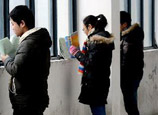
Generally, retired employees of government departments and State-funded institutions receive a much higher pension, around three times the sum collected by retired enterprise employees, according to Lu Xuejing, a social security expert at the Beijing-based Capital University of Economics and Business.
Wan Tianrong, a 51-year-old retiree from an auto parts manufacturer in Chongqing, said she is happy about the pension increase.
"My pension is only around 1,000 yuan a month," she said. "As prices continue to rise, I'm afraid I could not have made ends meet if the pension had been unchanged this year.
"I hope there will be a bigger increase next year for those who earn less-than-national-average pensions like me," Wan added.
Fan Ming, director of the institute of market economy at Henan University of Economics and Law, said the government's decision to raise pensions will not only help improve the group's livelihood but also boost domestic consumption.
Lu said currently retired enterprise employees' pensions are still low.
"It's policymakers' responsibility to improve people's livelihood, and making the decision to raise retirees' pensions through a meeting every year is not a normal mechanism for adjusting pensions," she said.
Retirees' pensions should change in accordance with the country's economic growth, employees' average wages and inflation, she suggested, adding that in the long run, the twin-track pension system should be integrated into one.
Hu Xiaoyi, vice-minister of human resources and social security, told Xinhua News Agency in December that the ministry plans to merge social insurances, including the retirement insurance of enterprise employees and people working for government and State-funded institutions. But he did not give a schedule for the plan.















 How hard to adopt an abandoned child in China?
How hard to adopt an abandoned child in China?


![]()
